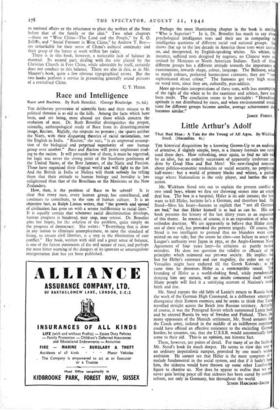Race and Intelligence
Race and Racism. By Ruth Benedict. (George Routledge. 75. 6d.)
THE deliberate perversion of scientific facts and their misuse to fit political theories is as old as the hills. Among the facts which have been, and are being, most abused are those which concern the evolution of man. Dr. Ruth Benedict distinguishes the proper, scientific, anthropological study of Race from its distorting mirror image, Racism. Rightly, she respects no persons ; she spares neither the Nazis, with their disgusting theories of racial nationalism, nor the English in India. " Racism," she says, " is an unproved assump- tion of the biological and perpetual superiority of one human group over another." Race and Racism will prove unpleasant read- ing to the racists. It will persuade few of them, it must be regretted, for logic was never the strong point of the Southern gentlemen of the United States, of the Boer fanners, of the Nazis and Fascists. These have organised their illogical world and will fight to the last. And the British in India or Malaya will thank nobody for telling them that their attitude to human biology and heredity is less enlightened than that of the Brazilians or the Mexicans or the New Zealanders.
How, then, is the problem of Race to be solved? It is clear that every race, every human group, has contributed, and continues to contribute, to the sum of human culture. It is an objective fact, as Ralph Linton writes, that "the growth and spread of civilisation has gone on with a serene indifference to racial lines." It is equally certain that whenever racial discrimination develops, human progress is hindered, may stop, may retreat. Dr. Benedict pins her hopes, for the solution of the problem, quite simply on the progress of democracy. She writcs: "Everything that is done in any nation to eliminate unemployment, to raise the standard of living, to ensure civil liberties, is a step in the elimination of race conflict." Her book, written with skill and a great sense of balance, is one of the fairest statements of the real nature of race, and perhaps the most bitter warning of the dangers of its ignorant or unscrupulous interpretation that has yet been published.
Perhaps the most illuminating chapter in the book is entitled " Who is Superior? " In it, Dr. Benedict has much to say abo4 psychological intelligence tests and their use in comparing th:{ intelligence quotients of different racial and national groups. Sin shows that up to the last decade in America these tests were carried on, and interpreted, by English-speaking whites. No whites, fa instance, suffered tests designed by negroes; no Chinese were et amined by Mexicans or North American Indians. Each of th different groups has a different attitude towards the importance examinations, towards shape, colour, language. The Balinese, ask to match colours, preferred harmonious contrasts; they are " vet( sophisticated about colour." The Samoans got very high scorn on word tests, since they are, culturally, pun-addicts.
More up-to-date interpretations of these tests, with less assumption of the right of the white to be the examiner and arbiter, have no been made. The conclusion seems to be inevitable: " Heredi aptitude is not distributed by races, and when environmental con dons for different groups become similar, average achievement al becomes similar."
JAMES FISHER.


























 Previous page
Previous page